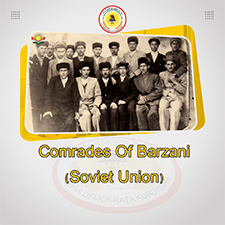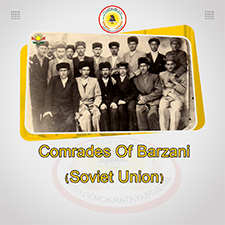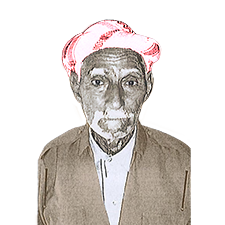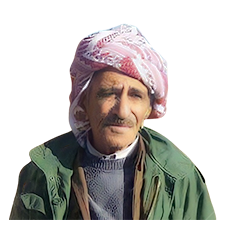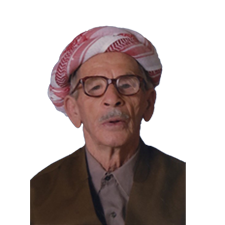Biography
Saleem Saeed Faqe Abdulrahman was born in 1906 in Barzani village, Barzan sub-district, Mergasur district, Erbil province. In the Soviet Union, he married Aziza Khairullah Saifullah and had two daughters, Zulikha Saleem born in 1958, and Zainab Saleem born in 1958.
Service Record
On October 11, 1945, after the failure of the Second Barzan Revolution, he moved to East Kurdistan. On March 31, 1946, he joined the Barzan Force of the Kurdistan Democratic Republic Army in Mahabad and participated in the battles of the Saqiz Front in the Kurdistan Democratic Republic. He was one of the Peshmergas who returned to Sherwan and Mazuri on 19/4/1947 through Khawkurk and Dashti Barazgar in North Kurdistan.
After their return, General Mustafa Barzani held a meeting with his comrades in the village of Argosh on 15 May 1947. He gave his comrades a free choice whether they want to stay or go to the Soviet Union. All his comrades decided to continue and leave for the Soviet Union. On May 23, 1947, Saleem accompanied General Mustafa Barzani to the Soviet Union and participated in the Battle of Qtur People and the Battle of Mako Bridge. On June 18, 1947, after plenty of difficulty, he crossed the Aras River on the border between Iran and the Soviet Union.
After arriving in the Soviet Union, on June 19, 1947, he and all his comrades were detained in Nakhchivan, Azerbaijan, for forty days in an open community surrounded by barbed wire and guarded by soldiers. In terms of food, clothing, and transportation, they had been treated as prisoners of war. They were later divided into the regions of Aghdam, Lachin, Ayulakh, and Kalbajar in the Republic of Azerbaijan on the decision of the Soviet government. On December 10, 1947, they were transferred to a military base on the Caspian Sea in Baku, the capital of the Republic of Azerbaijan. On the 23rd of the same month, they were given military uniforms and received eight hours of daily military training under the supervision of officers of the Republic of Azerbaijan. At the same time, they were taught Kurdish for four hours a day by some of their educated comrades.
After Jafar Bakirov's mistreatment of his comrades, Barzani decided to move his military camp from Azerbaijan on August 29, 1948, to the community of Chirchuk near Tashkent, the capital of Uzbekistan, where they continued their military training.
In March 1949, he and his comrades were distributed by train to the villages of the Soviet Union and worked on the farms of the “Kolkhozes” (land that people rented from the government and then gave a share of the product to the government).
After much effort and sending several letters by General Barzani to Stalin, Stalin finally received a letter in which Barzani talked about the suffering of his comrades. He immediately decided to form a committee to investigate the situation of Barzani's comrades. The committee finally decided to gather them all in Vrevsky, so in November 1951, General Barzani and his comrades went to Vrevsky, Soviet Union.
After the July 14, 1958 revolution in Iraq and the return of General Mustafa Barzani, on February 25, 1959, according to both Articles 3 and 7, paragraph (a) of Article 10 and according to Article (11), and based on the amended law No. 19, General Mustafa Barzani and his comrades were granted a general amnesty.
In 1958, the Iraqi Republic was established under the leadership of Abdul Karim Qasim. On April 16, 1959, President Barzani returned to Kurdistan with his comrades on the Groza ship through the port of Basra in southern Iraq.
After returning, he settled in Shaqlawa for a while and then moved back to Barzan village. He participated in the September Revolution in 1964. In 1975, after the collapse of the September Revolution, he was transferred to southern Iraq and settled in Diwaniya province. In 1980, he was transferred again to the Qushtapa community. On July 31, 1983, he and his son Khairullah Saleem (1967-1983) disappeared in the Anfal operation committed against the Barzanis by the Iraqi government in Qushtapa community.
Sources:
-
حهمید گهردی، پوختهی مێژوونامه، چاپی یهكهم، (ههولێر - دهزگای چاپ و بڵاوكردنهوهی ئاراس - چاپخانهی وهزارهتی پهروهرده - 2004ز).
-
ڕێكارێ مزویری، سهربۆرا تراژیدیایێن بارزانییان، چاپا یهكێ، (ههولێر - چاپخانا حاجی هاشم - 2013ز).
-
ڕێكارێ مزویریی، ژنێن رۆس و ڕاگواستن و ئهنفال و كۆمهلكوژی، (ههولێر - چاپخانهی مناره - 2010ز).
-
شهعبان عهلی شهعبان، ههندێك زانیاری سیاسی و مێژوویی، چاپی سێیهم، (ههولێر - چاپخانهی ڕۆژههڵات - 2013ز).
-
عمر فاروقی، سردار دانا زندگی و مبارزات مرحوم ملا مصطفی بارزانی، چاپ دوم، (ههولێر - چاپخانهی وزارت آموزش و پرورش - 2002ز).
-
عهبدولڕهحمان مهلا حهبیب ئهبوبهكر، عهشیرهتی بارزان له نێوان 1931 - 1991، چاپی یهكهم، (ههولێر - چاپخانهی وهزارهتی رۆشنبیری - 2001ز).
-
عومهر ههمزه ساڵح، جینۆساید و تاوانهكانی ڕژێمی بهعس دژی بارزانییهكان 1975 - 1991 له زمانی شایتحاڵ و بهڵگهنامهكانهوه، چاپی یهكهم، (ههولێر - چاپخانهی ڕۆژههڵات - 2017ز).
-
كاروان محهمهد مهجید، بارزانییهكان له مههابادهوه بۆ سۆڤێت، چاپی یهكهم، (سلێمانی - چاپخانهی پهیوهند - 2011ز).
-
گۆڤاری ههتاو، ژماره 154، ساڵی شهشهم، ههولێر، چاپخانهی كوردستان، ههینی، 15 نیسانی 1959.
-
له یادداشتی فهرماندهی شههید حهسۆ میرخان ژاژۆكی، 62 رۆژ لهگهڵ بارزانی دا چوونی بارزانییهكان بۆ یهكێتی سۆڤێت، چاپی یهكهم (ههولێر - چاپخانهی رۆشنبیری - 1997ز).
-
لیث عبدالمحسن جواد الزبیدي، ثورة 14 تموز 1958 في العراق، (بغداد - دارالرشید للنشر - 1979م).
-
مسعود بارزانی، بارزانی و بزوتنهوهی رزگاریخوازی كورد 1931 - 1958، (دهۆك - چاپخانهی خهبات - 1998ز).
-
نهجهف قولی پسیان، له مهابادی خوێناوییهوه ههتا لێوارهكانی ئاراس، و. شهوكهت شێخ یهزدین، چاپی یهكهم، (پیرمام - یۆبیلی زێڕینی پارتی دیموكراتی كوردستان - 1996ز).
-
ئـ.د.ئـ، فایلی ژماره AI-10، لیستی ههڤاڵانی مستهفا بارزانی بۆ یهكێتی سۆڤێت، بهڵگهنامه لهلایهن سهگڤان هاڵۆ پێشكهش كراوه، 2016ز.
-
ئـ.د.ئـ، فایلی ژماره HB-161، پارتی دیموكراتی كوردستان، بارهگای بارزانی، لێژنهی باڵای ناوچهی بارزان، فۆرمی سهلیم سهعید فهقێ عهبدولڕهحمان، پیرمام، 1 تشرینی دووهمی 2018ز.




